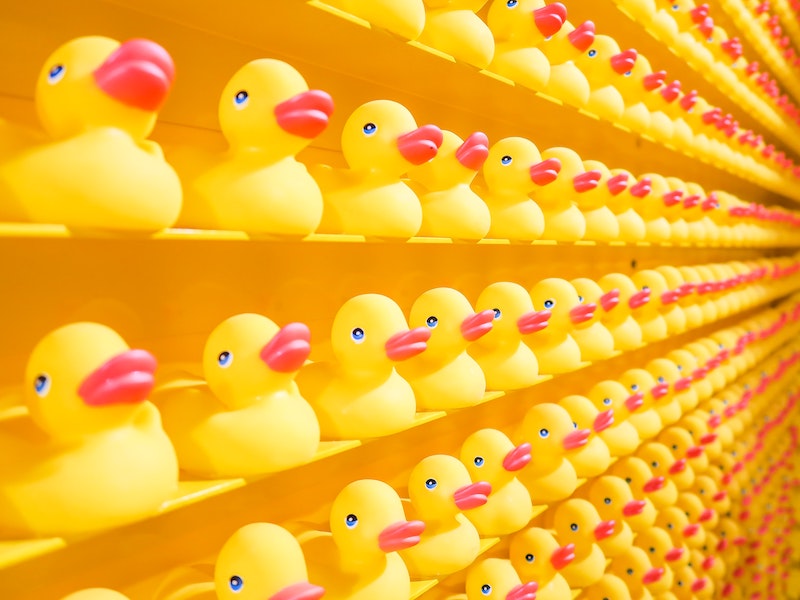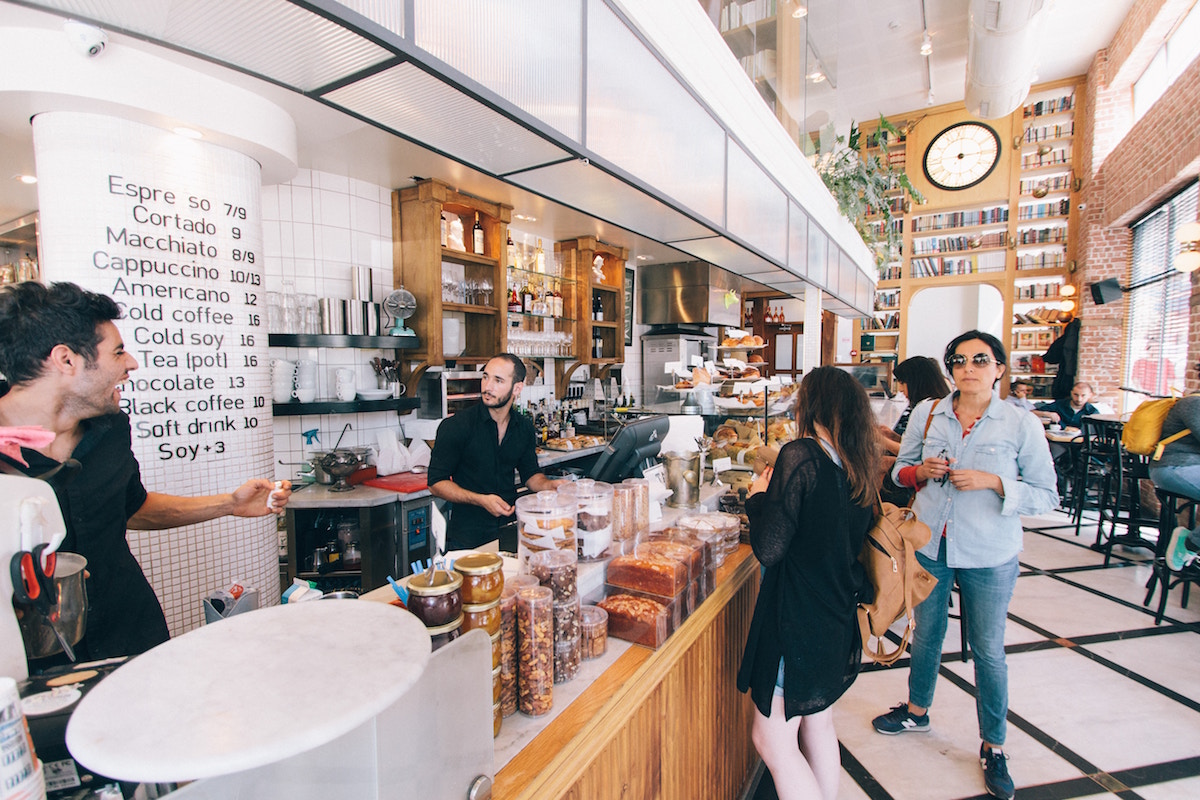The German Umlaute are the vowels a, o, u with two dots above: ä, ö, ü. Many German students are not sure in which words they have to add Umlaut dots and where not. In this post I’m going to give you some rules for this issue. The only diphthong with Umlaut is äu.
1. Masculine and neuter plural forms
Most masculine and neuter nouns with one syllable add Umlaut dots in plural:
a) Masculine words:
- Stuhl, Wunsch, Schuss, Schluss, Fluss, Fuß, Flug, Strumpf, Schlumpf, Bruch, Fall, Zahn, Bart, Klang, Draht, Schlag, Bach, Pass, Plan, Platz, Ball, Markt, Stand, Strand, Tanz, Ton, Kopf, Topf, Stock, Block, Rock, Frosch, Bauch, Brauch, Strauß, Traum, Baum, Kauf, Lauf (also: Geruch) → add Umlaut dots on the vowel and –e at the end of the word: Stühle, Köpfe, Zähne, etc.
- Saal → follows the same rule: Säle (there is no double Umlaut in German).
- Mann, Wald, Rand, Mund, Strauch → add Umlaut dots on the vowel and –er at the end of the word: Männer, Wälder, Münder.
Exceptions: Ort, Laut, Mond, Hund, Wal, Schuh, Pfund, Pfad, Triumph (neuters: Schaf, Haar) → add no Umlaut dots on the vowel, they just add –e at the end of the word: Monde, Hunde, Schafe. (Bus doubles the -s- for phonetic reasons: Busse; Ohr adds the ending -en: Ohren).
4. Masculine words with 2 syllables ending in –er/-en/-el → add only Umlaut dots (on the first vowel) in Plural: Vater → Väter (also: Mutter → Mütter), Bruder → Brüder, Schwager → Schwäger, Hafen → Häfen, Faden → Fäden, Vogel → Vögel, Apfel → Äpfel, Nagel → Nägel (exception: Daumen, Haken, Krater, Rahmen don’t change in Plural).
But usually, words with 2 syllables do not add Umlaut dots in plural, they only add a final –e: Monat, Telefon, Regal, Metall (also words with ending -at: Salat, Spinat, Plakat) → Monate, Telefone, Salate, etc.
b) Neuter words → add Umlaut dots on the vowel and –er at the end of the word: Haus, Kraut, Buch, Tuch, Dach, Rad, Blatt, Fach, Schloss, Loch → Häuser, Bücher, Dächer, Schlösser, etc.
c) There are a few feminine nouns that add Umlaut dots on the vowel and –e at the end of the word: Stadt, Nacht, Naht, Macht, Hand, Wand, Kraft, Gans, Nuss, Wurst, Brust, Luft, Sucht, Haut, Maus, Laus → Städte, Würste, Mäuse, etc. (also the nouns ending in –kunft: Ankunft → Ankünfte).
2. Derivations
a) Adjectives from nouns: Tag → täglich/tägig, Nacht → nächtlich, Woche → wöchentlich, Jahr → jährlich/jährig. Person → persönlich, Natur → natürlich. Mann → männlich, Vater/Mutter/Bruder → ¨-lich. Tod → tödlich, Kunst → Künstler/künstlich, Jude → jüdisch, Gebrauch → gebräuchlich, Sache → sächlich, Hass → hässlich, Burg → Bürger/bürgerlich. Auge → -äugig, Macht → mächtig, Kraft → kräftig. Wut → wütend, Vernunft → vernünftig, Sucht → süchtig, Stahl → stählern, etc. (exception: Hand → handlich, Zorn → zornig).
b) Nouns from adjectives: kalt → Kälte, warm → Wärme, groß → Größe, Glätte, gut → Güte, stark → Stärke, nah → Nähe.
c) Nouns from verbs: schlagen → Schläger, laufen → Läufer, kaufen → Käufer, verkaufen → Verkäufer, empfangen → Empfänger, tragen → Träger, blasen → Bläser, raten → Rätsel, stehen/stand → Ständer/ständig.
d) People related to the noun: Schule → Schüler, Schaf → Schäfer, Mord → Mörder, Tat → Täter, Tanz → Tänzer (also: Arm → Ärmel).
e) A few feminine forms: Franzose → Französin, Arzt → Ärztin, Koch → Köchin, Anwalt → Anwältin, Schwager → Schwägerin, Jude → Jüdin.
f) Verbs from nouns or adjectives: Farbe → färben, Zahl → zählen, Kamm → kämmen, Naht → nähen, Flucht → flüchten, Wolke → bewölken, (Be-)Trug → (be-)trügen, Glanz → glänzen, Blatt → blättern, Schlupf → schlüpfen (also: Schlüpfer). Mund → münden, Drang → drängen (also: drängeln), Haken → häkeln, Lachen/lachen → lächeln (also: lächerlich); glatt → glätten, stark → stärken, schwach → schwächen (also: schwächeln), schmal → schmälern, zahm → zähmen (also: Rauch/rauchen → räuchern).
g) Irregular verbs with -a- add Umlaut dots in the 2nd and 3rd person singular: fahren → du fährst, er/sie/es fährt; schlafen → du schläfst; laufen → du läufst; there is just one with -o-: stoßen → du stößt.
h) Diminutive forms: Stuhl → Stühlchen, Schrank → Schränkchen, Buch → Büchlein, Kasten → Kästchen, Flasche → Fläschchen/Fläschlein, Katze → Kätzchen, Lampe → Lämpchen, Blume → Blümchen/Blümlein (Eichhörnchen comes from Eichhorn and Mädchen comes from Magd).
i) Comparative and superlative forms of adjectives with one syllable : groß → größer → am größten, (k)alt → (k)älter → am (k)ältesten, hoch → höher → am höchsten, nah → näher → am nächsten, lang → länger → am längsten, also: arm, stark, dumm (the only adjective with 2 syllables: gesund → gesünder → am gesündesten). Exceptions: schmal, rund, glatt don’t add Umlaut dots.
j) Derived adjectives meaning “similar to” (-ish): rot → rötlich, blau → bläulich, grau → gräulich, schwach → schwächlich (exception: rund → rundlich).
k) Causative forms: fallen → fällen, futtern → füttern, saugen → säugen, schlafen → einschläfern; verbs with different meanings: zahlen/zählen, fordern/fördern, drucken/drücken, ausdrucken/ausdrücken.
3. Modal verbs and irregular Verbs
1. There are 4 modal verbs having Umlaut in infinitive and plural: können, dürfen, müssen, mögen. Their singular has no Umlaut: kann, darf, muss, mag (wollen and sollen have never Umlaut).
Important in Präteritum: the form without Umlaut is the indicative expressing something real, something that happened: ich konnte, du durftest, er musste, wir mochten.
On the contrary, the form with Umlaut is conditional and expresses something that is not real, that is imaginary, that may or should happen, or it’s the polite form: ich könnte, du dürftest, er müsste, (special: wir möchten, see here).
2. This is also the case with irregular verbs: hatte (indicative = real) vs. hätte (conditional), warst vs. wärst, kamst vs. kämst, gabst vs. gäbst, sprachst vs. sprächst, etc.
4. Others
Be careful with these 2 words that have different meanings: schon (already) / schön (beautiful, good, well)
These words and all the derived forms have always Umlaut: blöd, hören, fünf, grün, süß, früh/spät, für, über(-)/übrig, zurück/Rücken, Gemüse, Büro, fühlen, lügen, schüchtern, nüchtern, tüchtig, Stück, Müll, Wüste, Tüte, Blüte, Tür(e), Bürste, Brücke, Mücke, Mütze, Pfütze, Würde, Körper, Käse, Gespräch, Gerät, Bär.


